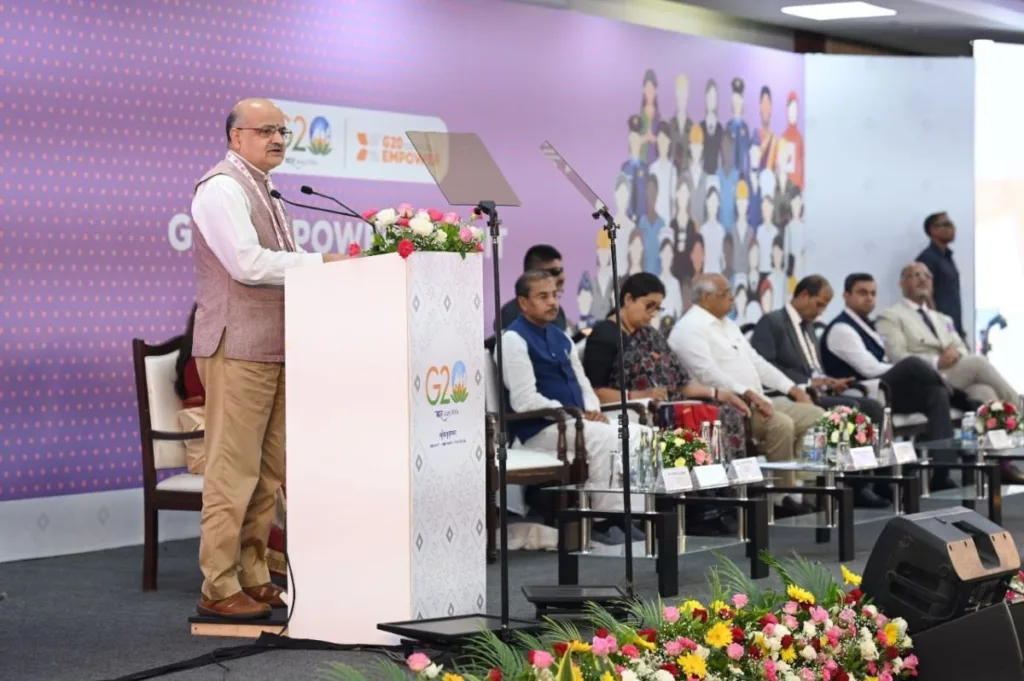The G20 EMPOWER Summit commenced in Gandhinagar, Gujarat, following the success of the Inception Meeting in Agra, Uttar Pradesh, and the 2nd meeting in Thiruvananthapuram, Kerala earlier this year. The summit, held during India’s G20 Presidency, focused on women-led development, emphasizing a life-course approach rather than merely women’s empowerment.
The G20 EMPOWER Summit witnessed the participation of more than 300 individuals, comprising 263 domestic participants and 70 international delegates. These delegates hailed from 13 G20 member countries, four guest countries, and eight prominent international organizations, including the World Trade Organization, United Nations, UN Women, UNICEF, International Labour Organization, World Bank, and Asian Development Bank.
The inaugural session featured esteemed speakers, including Union Minister for Women & Child Development and Minority Affairs, Smriti Zubin Irani, Chief Minister of Gujarat, Bhupendra Patel, and representatives from various international organizations and agencies. The summit highlighted the achievement of tangible outcomes and identified commitments and recommendations for three key themes: Education as a Pathway to Women’s Empowerment, Women’s Entrepreneurship, and Promoting Women’s Leadership at All Levels, with a particular focus on grassroots levels.
One significant enabler throughout the discussions was the importance of digital inclusion. G20 EMPOWER scaled up ongoing initiatives and introduced new outputs to promote gender equality and women’s advancement. The participants emphasized narrowing the digital gender divide by improving women’s access to digital resources, education, entrepreneurship opportunities, and leadership roles.
The summit also witnessed the launch of TechEquity, a Digital Inclusion platform aimed at providing education and upskilling opportunities to women globally, particularly in the fields of digital literacy, financial literacy, and technical areas. The platform’s goal is to offer courses in 120 languages and reach one million users worldwide.
During the event, the G20 EMPOWER Best Practices Playbook was significantly expanded, incorporating 149 best practices from 19 G20 countries. The playbook was digitized to enhance accessibility and now focuses on encouraging private sector initiatives for women at the grassroots level.
Chair of G20 EMPOWER, Dr. Sangita Reddy, stressed the importance of nurturing women’s leadership and decision-making roles across all societal levels, as the summit’s recommendations take significant strides towards achieving this goal.
Moreover, the summit saw the development of three papers on important themes, including corporate women empowerment, STEM education, and financial inclusion. To drive women’s participation and progression, G20 EMPOWER recruited advocates, particularly CEOs and organization heads, to promote the initiative’s messages within their companies, sectors, networks, and countries.
G20 EMPOWER Best Practices Playbook Expanded
Additionally, 73 Inspirational Stories from nine countries were curated on the G20 EMPOWER Website to highlight the success stories of women achievers across the G20 nations and invited countries, inspiring the next generation of girls and women.
The G20 EMPOWER Summit’s emphasis on citizen engagement led to 51 Jan Bhagidari or citizen engagement events, reaching over 100,000 people, to disseminate the message of women’s empowerment and the underlying actions.
The summit concluded with a call to prioritize women to achieve equitable and empowered growth. Prime Minister Narendra Modi’s vision of a new India, where women play an equal and pivotal role in driving robust, sustainable, and inclusive growth, remains a central focus during India’s G20 Presidency.

